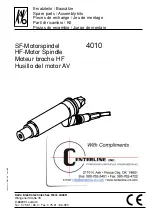
OPERATION & ADJUSTMENTS
FIGURE
8
FIGURE
9
FIGURE
10
Fence Adjustments - Front to Back
The fence can be moved across the table to expose as much or as little of the
cutterhead as needed depending on the width of the workpiece.
1) Loosen the fence adjustment lock handle (A) Fig.8 by turning handle counter-
clockwise.
2) Manually adjust the fence (B) across the table to the desired position.
3) Retighten the fence adjustment lock handle (A) by turning handle clockwise.
Make sure this is done before jointing the workpiece.
Fence Tilt
Most jointing operations are done with the fence in the vertical position, 90º to the
table. The fence can also be tilted back as far as 45º when needed.
1) Adjust the fence front to back positioning as per the instructions above.
2) Loosen the fence tilt lock handle (A) Fig.9 by turning handle counterclockwise.
3) Lift the fence (B) slightly above the table and tilt it to the desired position.
4) The adjustable positive stop (C) can be used to quickly set the fence to 45º.
5) With the fence set to the desired angle, retighten the fence tilt lock handle (A)
by turning handle clockwise. Make sure this is done before jointing the
workpiece.
ADJUSTING THE FENCE POSITIVE STOPS
90º Positive Stop Adjustment
1) With the fence set against the 90º stop (A) Fig.10, place a square (B) against
the table and fence as shown. If the fence is not square to the table, a fine-tune
adjustment of the 90º stop will be required.
2) Loosen the fence tilt lock handle (C).
3) Using a square (B) as a guide, manually set the fence (D) square to the table.
4) Hold the fence in place and adjust the 90º stop set screw (E) until it touches the
fence bracket (F).
5) Retighten the fence tilt lock handle once the adjustment has been completed.
45º Positive Stop Adjustment
1) With the fence set against the 45º stop (A) Fig.11, place a square (B) against
the table and fence as shown. If the fence is not 45º to the table, a fine-tune
adjustment of the 45º stop will be required.
2) Loosen the fence tilt lock handle (C).
3 Using your square as a guide, manually set the fence (D) 45º to the table.
4) Hold the fence in place and adjust the 45º stop set screw (E) until it touches the
fence bracket (F).
5) Retighten the fence tilt lock handle once the adjustment has been completed.
FIGURE
11




























